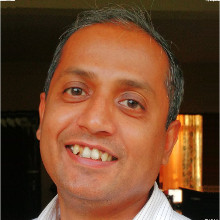[Photograph by Hans Braxmeier under Creative Commons]
Shatrughan joined us about five years back as a digital production executive. His work involved conversion of documents into digital formats, finding inconsistencies during the transformation, and fixing it. Most of his work required him to spend his time making tedious manual interventions in documents. He did that for his first two years.
Today, Shatrughan plays a vastly different role in the organization. He builds content production tools, and by this I mean he codes products using PHP and MySQL. He has built workflow tracking tools, content aggregation tools and custom analytics widgets for us.
Often, he steps in as a web server administrator for our digital sites, CarToq.com and FressUp.com. Just last week, he came up with a modified approach to content tagging, which our database consultant found useful as it enhanced the scalability of the solution.
Shatrughan has no technology background. He is a graduate in commerce, with a distance learning MBA degree. But he exemplifies a growing bunch of people, who have taught themselves new skills, on the job—and have thus grown rapidly with these self-taught skills.
Working with people like him, I have come to believe that people have an endless capacity to enhance their potential. All they need from the organization is an enabling framework. That isn’t much of an ask, but we will come to that in a bit.
This has been a significant discovery because on this path the gains are significant, for all stakeholders. Those who keep acquiring new skills are always on a fast-growth track. As they make themselves more and more useful, they open up newer opportunities for value creation for the organization.
For us, where finding quality talent is becoming harder (an experience I shared in my previous article, What we can do about the rising challenges in hiring), such people solve an even more important problem. If people from within can be deployed in newer roles with relative ease, it mitigates the need for hiring talent from outside.
When we started out, our organization design did not necessarily seek to maximize the potential of our people, but this is an explicit goal for us now. Over the past three years, people productivity has risen by over 50-70% in some of our projects, and we are a 25%-plus net margin business. Here’s what we discovered helps unlock the potential of our people.
Delegate “recklessly”: This may sound, well, reckless. And yet, consider this example. In a large content project, we hired a person fresh from college. This project was a little complex, requiring real-time collaboration between multiple teams. We were struggling to get things right, despite having seasoned editors on the job.
Shubham, our college recruit, however wasn’t struggling with his tasks. What’s more he repeatedly volunteered to take on additional tasks. We gave him some, and then some more—and he would handle it with ease.
Even though he was a rookie, we ended up giving him a bigger role in the project. Soon, Shubham became the nodal point for teams to coordinate with each other. He could multi-task better than most; he was a fast learner; and he reveled in challenges.
Given an opportunity, our project leaders delegate enthusiastically to juniors all the time. I don’t recall any leader ever flagging concerns about inexperience in their team. There have been occasions when things haven’t worked out as planned, but that hasn’t made us more “cautious”.
In our experience, aggressive delegation works well with people who have the following trait in abundance.
Relentless learners: There is a difference between learning, and a relentless quest. People who are characterized by the latter go a lot farther.
Binay epitomizes this trait. Until a year ago, he was our expert in global financial content, leading a global financial media project for us. Today, he leads quality for technology content project for a Fortune 500 client. From high-end finance to technology, Binay made this transition effortlessly.
From our experience with other people, we knew it couldn’t have been easy for him. We have searched hard to find a good domain writer. Writing in the intersection of business and technology requires expertise in both domains, which isn’t easily acquired.
People such as Binay are driven by a deep desire to grow by learning new things—they don’t need much extrinsic motivation. What we do, on our part, is make sure nothing comes in their way as they take on these formidable challenges.
It’s isn’t about giving preferential treatment over others—we are just that bit more sensitive to potential hurdles that might come their way and how we can keep improving the enabling conditions.
Crisis as a catalyst: This was a surprising discovery for us. Earlier, we used to believe that our people should be shielded from adverse business developments (a project lost, pricing pressure from clients, etc).
At some stage, we started sharing information more freely about negative developments as well. We were surprised how people responded, pushing themselves willingly into uncharted waters—and succeeding.
In one such situation, when a client reduced the work scope with us, the project team suddenly had a lot of free time on their hands. With no inputs from outside, the entire team took it upon themselves to learn e-book publishing skills. They created a portfolio, and then sought me out with a proposal that we should start offering e-book publishing services to our clients.
In case you are wondering whether pressure about potential job loss made them act in this fashion, that wasn’t the case. We have never fired people because we lost a business (non-performance has been the only criteria).
Experiences such as this, and the business benefits they have engendered, have made us gradually believe in the limitless potential of our people.
And if this is a valid belief, any organization can only have the following mission: to be an enabling agent for its people to help them realize their potential. Return on investment will follow.

